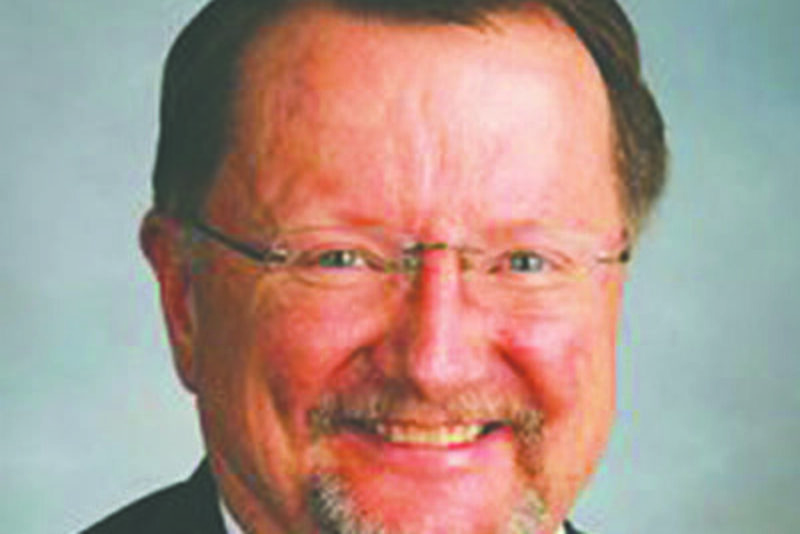Sean C. Morgan
Fred Girod wants to continue to bring a rural voice to a Portland-dominated legislature in Salem.
The Senate District 9 Republican incumbent is running in the Nov. 8 election against Democratic candidate Rich Harisay and Libertarian Jack Stillwell. The district includes Sweet Home and Lebanon in eastern Linn County, eastern Marion County and southeastern Clackamas County.
“The reason I’m running again is simply I’m sick and tired of Portland and Eugene running Oregon,” Girod said, adding that for his district “it has not been a success story.”
“I relate the best to the district I have,” Girod said. “My Democrat opponent wants to eliminate all corporations.”
Stillwell, the Libertarian, wants to say he’s to Girod’s right on finances, Girod said, basing his comments on a debate they held in Silverton, and that’s not the case.
“I’ve done a good job for the people I represent,” Girod said. “And I have a good staff.”
Girod said he has served on several committees that do help out Linn County and his district.
He serves on the Ways and Means Committee and on the subcommittee for education.
He chairs the Capital Construction Committee, which helped pave the way to build the Veterans Home and the medical school in Lebanon. The committee deals with infrastructure improvements.
He also serves on the Transportation Committee, which has been looking at a multi-modal station in Lebanon, where trucks arrive and load freight trains bound for the Port of Seattle.
“There’s a lot of activity on those committees,” Girod said. They make a a lot of decisions. On the Capital Construction Committee, which includes Girod and five Democrats, the senators decide how to spend dollars allocated to the committee.
It spent $200 million at Ore-gon Health Sciences University in Portland, Girod said, and it provided funding to Linn-Benton Community College’s Advanced Transportation Technology Center. The first phase was completed in 2013. It addresses the training needs of automobile mechanics to work on traditional and alternative fuel passenger vehicles.
A second and third phase includes facilities for diesel and heavy equipment mechanics and space for training in alternative fuel for mechanics already working in the community. A grand opening celebration was held Oct. 20.
“I just got back from LBCC,” Girod said last week, following a tour of the AATC. “I’m really, really proud of the facility.”
Coming up in 2017, the legislature has a “whole list of bills” that will mostly be monetary if Measure 97 passes, Girod said. If it fails, the state will fall short $1.4 billion on a budget of about $20 billion.
Girod said he opposes Measure 97 “more because it’s deceptive than what it is they’re asking for.”
While proponents say the measure targets big business – those grossing $25 million or more per year – and everyone else is getting off scott-free, the average household will pay $600 more per year at the checkstands, he said.
“I think you just need to have truth in advertising in Measure 97,” Girod said.
Money is the biggest issue, Girod said. Oregon is supposedly moving forward as a state, but it’s bankrupt because it hasn’t dealt with the cost drivers. Meanwhile the governor approved large salary increases for state employees, and the state still hasn’t dealt with the unfunded liabilities in the Public Employees Retirement System.
“You can’t guarantee 7.5 to 8 percent return till someone’s in their 80s,” Girod said. That’s a huge cost driver, he said, noting that, at the same time, students have difficulty getting an education.
That’s where he has been able to help with the new facility at LBCC.
Not everyone will go to a four-year college, he said, and mechanics are in demand with job offers as soon as they finish the program.
He said there is a need for basic auto mechanics in an era when the average person can no longer fix their own vehicle.
“We need people to do that.”
Girod said he’s changed his game a little bit.
“It’s important we work together for the betterment of Sweet Home,” he said. His job is to make sure people understand that rural Oregon is important, from the fire suppression to the logging industry that is the backbone of his district.
“Ever since I’ve been alive, my district has been dependent on timber and agriculture,” he said. He has done everything possible to keep environmental groups off its back. He does what is best for his rural district and its timber, agriculture and small business economy.
And the state has been making it harder with its minimum wage increase, he said. “How do you compete with Idaho?”
New sick leave, family leave and retirement requirements add to the burden, he said. He is concerned about predictive scheduling in the next legislative session. It’s something that large businesses can handle, but small business will have a hard time.
Girod would like to give rural Oregon a stronger voice, and he has a bill modeled on the federal Constitution that would change the senate to 36 members, one from each county in the state. Currently, each senate district represents two house districts based on population.
Nationally, each state sends two delegates to the senate, regardless of population.
“Then you have Portland, that could dominate the house,” Girod said. “Rural Oregon would dominate the senate.”
Between the two of them, they’d have to weed out the garbage to get things done, he said.
If the bill were approved, it would amend the state constitution and require Oregon voters to approve it.





